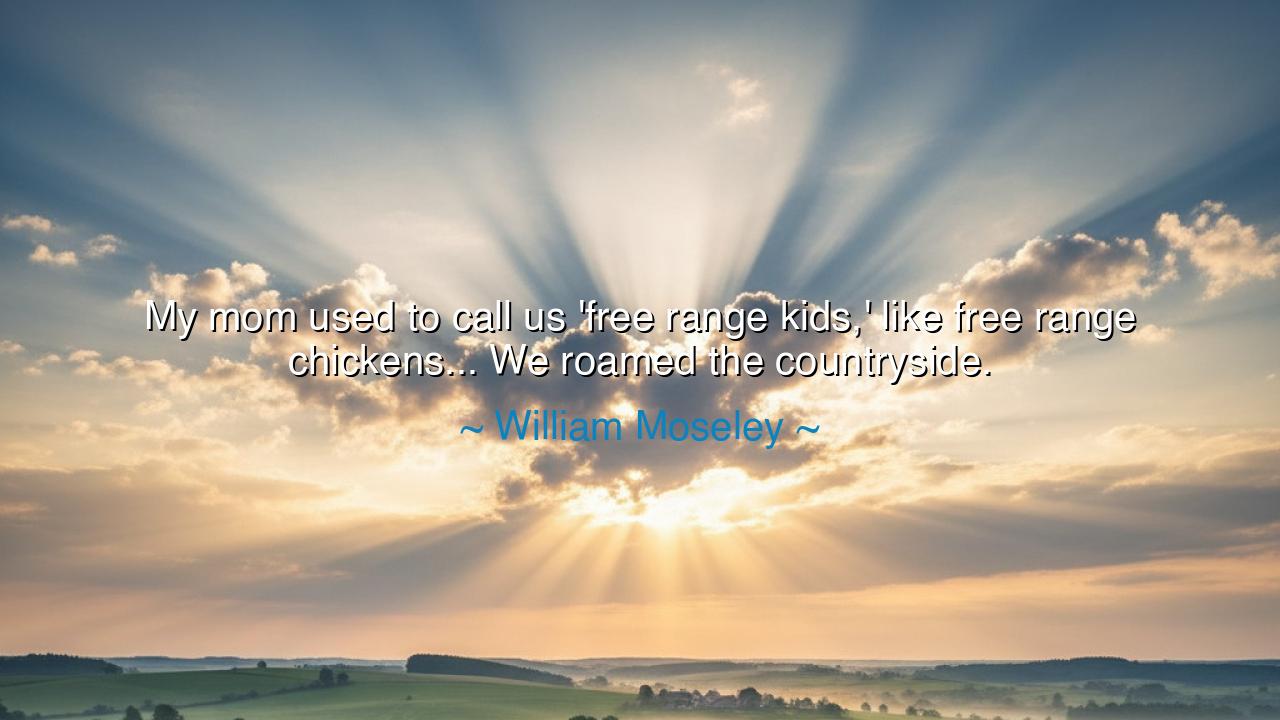
My mom used to call us 'free range kids,' like free range
My mom used to call us 'free range kids,' like free range chickens... We roamed the countryside.






The words of William Moseley, “My mom used to call us ‘free range kids,’ like free range chickens… We roamed the countryside,” carry within them the scent of grass, the warmth of the sun, and the freedom of a childhood untouched by walls. Though spoken lightly, they echo with a deeper wisdom — a remembrance of a time when the world itself was a classroom, when adventure replaced distraction, and when the soul of a child could grow in the wide expanse of nature, unchained from the screens and fears that bind so many in the modern age. Beneath the humor of his words lies a profound truth: that freedom is the first and greatest teacher, and that those who grow close to the earth often carry within them a strength the world has forgotten.
To be a free range child is not merely to wander without direction; it is to learn by living. It is to fall and rise, to explore without constant supervision, to find courage in solitude and joy in discovery. In such a life, the boundaries of the world are not defined by fences, but by curiosity. The ancients would have understood this well. The youth of Sparta, for instance, were not coddled or confined — they were sent into the wild to learn endurance and resourcefulness. The children of the Maasai learned from the plains, the hunters of old from the forest, the shepherd’s sons from the mountains. The earth was their mentor, and in its lessons they gained self-reliance, resilience, and awe. So too did young Moseley, roaming his countryside, learn a kind of wisdom that no classroom can impart.
This spirit of freedom — of running barefoot through the fields, of learning the language of wind and soil — connects all generations of humanity to the sacred rhythm of life. When a child roams, he encounters both danger and wonder. He learns to judge the path, to find balance between risk and caution, to see beauty in the ordinary. In those small adventures, a soul begins to understand what it means to be alive. Freedom, in this sense, is not recklessness, but trust — a parent’s trust in the world’s lessons, and a child’s trust in his own courage. It is the soil from which maturity grows.
In contrast, our age has traded the countryside for confinement. The children of today are surrounded not by meadows, but by walls and screens. Their imagination is fed by images, not by experience. They learn about life through simulation rather than sensation. The laughter that once echoed across fields is now replaced by the quiet hum of devices. Moseley’s reflection, then, becomes a lament for what has been lost — the innocence of unstructured play, the strength of independence, the bond between nature and the human spirit. It is sad, in a way, that safety has replaced freedom, and convenience has replaced exploration.
There is a historical parallel here in the writings of Jean-Jacques Rousseau, the philosopher who proclaimed in Émile that children should be raised in harmony with nature. He believed that wisdom grows from the direct encounter with the world — from touching, seeing, feeling, failing. A child too sheltered becomes a captive of fear; a child allowed to roam learns confidence. Rousseau’s teaching and Moseley’s memory sing the same hymn: that to be alive is to engage the world with one’s own hands, not merely to observe it from afar. The roaming child becomes the grounded adult, capable of facing both hardship and wonder with grace.
In this, there is also a moral lesson for parents and elders. To love a child is not to enclose them in constant safety, but to grant them the space to grow — to fall, to learn, to discover who they are in the wilderness of life. The mother who called her children “free range” gave them more than freedom; she gave them trust, and through that trust, she gave them strength. The same principle applies to the soul itself: it must wander, test, and explore to mature. A person who never steps beyond comfort never truly knows himself.
The lesson of Moseley’s words is thus both simple and profound: reclaim your freedom, and give freedom to those you love. Walk outside. Touch the living earth. Allow yourself to be guided not by schedules, but by the pulse of curiosity. Do not fear the unknown; let it awaken you. For the child who roams the countryside becomes the adult who can navigate the wilderness of life with calm and courage.
So remember, as the ancients might have said: the world itself is a sacred teacher, and its lessons cannot be learned behind closed doors. Whether in youth or age, step beyond the fences of habit. Let the wind find your face, the ground feel your steps, and your heart remember what it means to roam. For it is in movement, not stillness, that the spirit discovers its wings — and in freedom, that we return to the essence of what it means to live.






AAdministratorAdministrator
Welcome, honored guests. Please leave a comment, we will respond soon